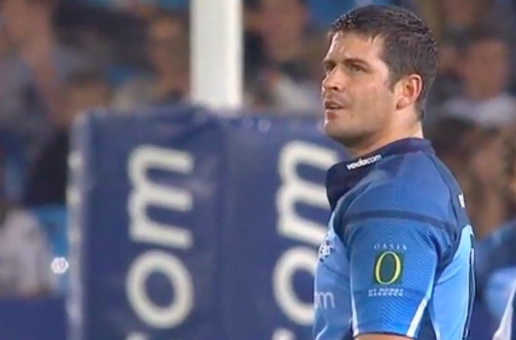To figure out why there has been more than a little derision concerning the South African game from Kiwis, Aussies and even Springbok

fans of late, I suggest you read the following statement from Morne Steyn.
“We’ve won a Tri-Nations with the same game plan and in 2007 we won the World Cup with these tactics,” he said. “We have to stay with this strategy.” All teams that win the Super 15 are the teams that kick the most. The Crusaders, the Reds, the Bulls when we won it. At the Bulls, we get some grief for kicking too much. It’s not kicking the ball away; it’s kicking for a purpose. People out there don’t have the stats.”
Steyn is an adequate player for international level. No more or less; nonetheless, what he has won renown for is his prodigious boot. When combined with a big burly forward pack and rule changes the combination can be troubling. Yet there is a huge irony here for Steyn and those of his mindset. The ‘stats’ he so eagerly discusses are in reality more troubling for his own team than the opposition. While there have been one or two blips, the South African rugby style, unlike Australia and New Zealand’s, has developed relatively little since the game turned professional.
Those pesky numbers
The Springboks have won three Tri Nations titles, like Australia. In contrast to South Africa and New Zealand, the Australian teams that have won the tournament have done so with some inconsistent front rows [nice understatement – Ed.] but played some jolly entertaining rugby. Now all things being equal the Wallabies have tended to play a far different game. It must come as a surprise to Steyn that they are still on an equal footing with the Boks.
The Springboks’ Tri Nations victories (excepting 1998, when they played with a lot more enterprise) were won playing ten-man rugby. So for all of Steyn’s justification, I have to ask to what extent were their tactics serving their game before he turned up anyway? If we combine Australia’s tally of three titles with fellow ball-runners New Zealand’s ten, it is a rather staggering 13-3 on the NZ–Aussie side of the ledger.
Certain factors have aided Springbok rugby over the years, including a number of stupid rule changes that killed off much of rugby’s running game between 2006 and 2009. Yet it is important to point out that even with favourable rules, South Africa’s return of only one Tri Nations title during the period is actually quite poor. The All Blacks won three titles in a row and Australia finished second in all those years.
Now there was a Springbok World Cup win in 2007. Granted, the Springboks had a very good set piece game — but as everybody including theiur fans know, they had a very, very easy run to that final. So easy, in fact, they would have bypassed Australia and New Zealand (even if either team had won their respective quarter finals). While Tri Nations form is no indicator of success in the RWC, both teams’ superior levels of fitness and skill had been used to beat the Saffas convincingly in the Tri tournaments in the years previous, in particularly the 2007 series. As it turns out, South Africa just happened to play the semi and the final against two teams who played the same style of rugby they — and that was that.
The pointy end
Let’s get medieval on this — how many times have the Springboks been beaten by the All Blacks and Australia since ‘game breaker’ Steyn has been playing?
Well he has played eight times against the All Blacks and has four wins, which is a good record. However, three of those wins were in 2009, at the height of the penalising-the-attacking-team madness. Against Australia, his record is not good at all; he has played ten times for just three wins. Overall, with Steyn at the helm, the Springboks have seven wins from 18 matches against Australia and New Zealand (as at the date of posting).
In World Cup tournaments, the running games of Australia and New Zealand have won four titles; the Springboks’ kicking game has earned two and England’s (their clones) one.
Steyn’s brand of ‘winning’ rugby has thus left South Africa with a decidedly uneven return.
The tragedy of all this is that while the South Africans have generally been more conservative than New Zealand and Australia, in the Super competition the last few years we have all seen that they have some very good solid backs and penetrating runners when given the chance. Because of the stranglehold Steyn seems to have on the current South African coaching psyche, many Springbok backs (bar Francois Hougaard, nowadays) seem bereft of ideas and the team lacks real attacking structures and moves.
This is sad stuff from a country that has produced some wonderfully talented attacking players over the years like Andre Joubert, Dannie Gerber, Chester Williams, Bryan Habana, James Small, Joost van der Westhuizen and Dannie Craven (this is just for starters).
I agree with Bok fans wholeheartedly: for South Africa to consistently challenge New Zealand and Australia, they have to provide more balance to their team by providing better attacking ball to their backs. Selecting better suppliers and players who are more dynamic must be a priority.

